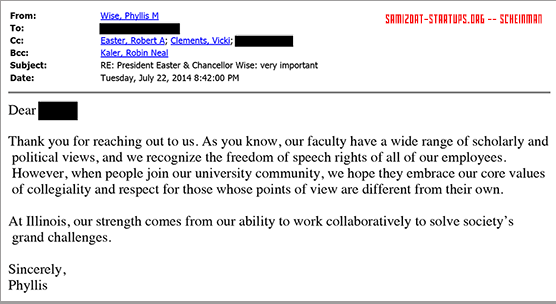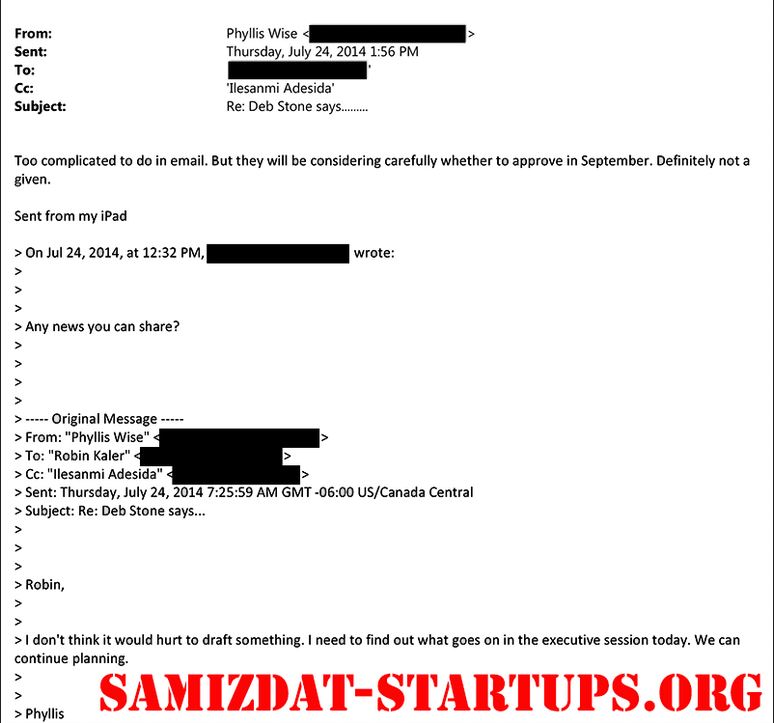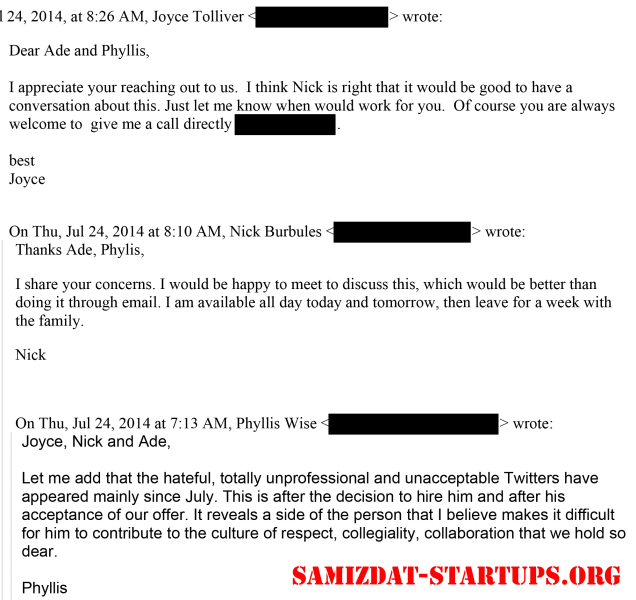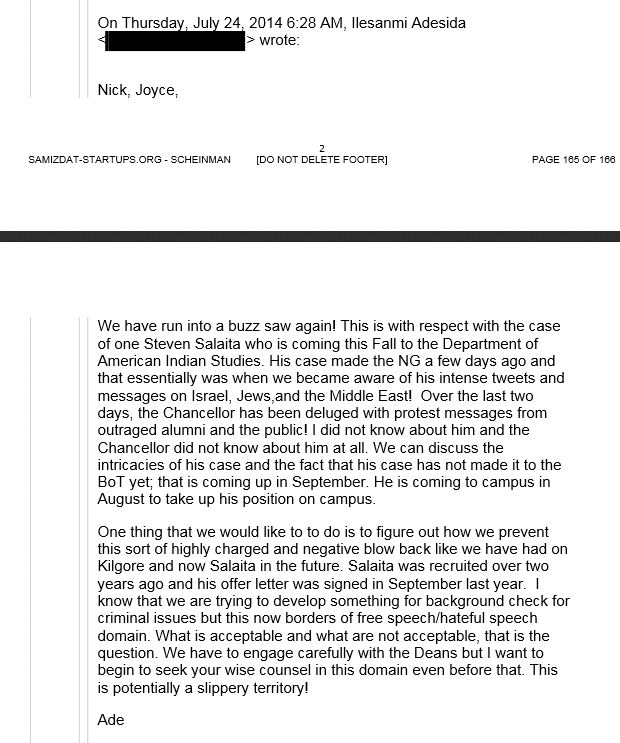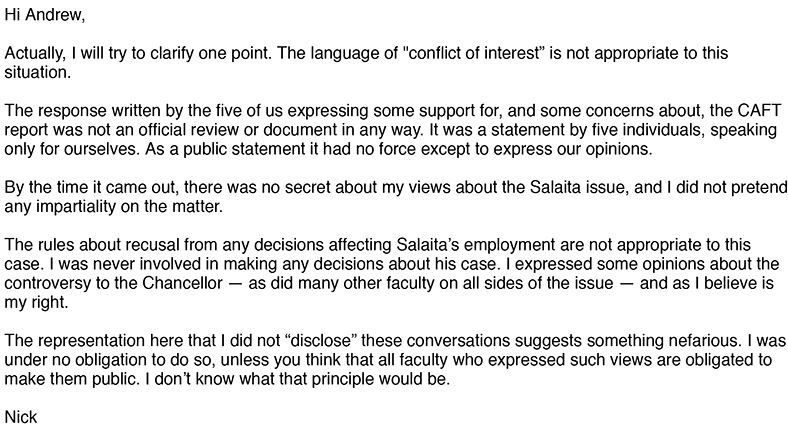In the first six months of 2015 the Steven Salaita drama has played out in a number of acts, or scenes, culminating in the American Association of University Professors (AAUP) formally censuring Illinois in June. Matt Finkin talks about how his career at Illinois is bookended by the university twice having been censured by the AAUP.
Finkin, who teaches in the law school and also holds an appointment in the prestigious Center for Advanced Study, arrived on campus at the very end of the Koch case, in 1967. Four years earlier, Leo Koch, an assistant professor of biology, had published in the student newspaper a defense of consensual sex between students. This so angered the campus and community that Koch was summarily fired by the university president. For the AAUP, this constituted a violation of due process, and they censured Illinois. It took four years for the university to mend its ways, and in 1967 the ban was lifted. What is ironic is that one key step was to revise the University Statutes, the governing regulations of the university, and make guarantees of academic freedom even stronger than the guidelines followed by the AAUP itself.
Forty eight years later the university has violated its very own statutes, in the case that comes as Finkin prepares to retire, the Steven Salaita affair. In the meantime, Finkin has established himself as the leading authority on academic freedom in the country. After summarily dismissing Prof. Salaita, the AAUP has again formally censured the university on June 13, 2015. Consensual sex in 1960, and tweets opposing Israel’s 2014 Gaza war now. Substantively, there seems to be no real comparison between the two cases: a single letter to the editor on consensual sex versus multitudinous anti-Israeli tweets on a war that killed over 2200 Palestinians, including 550 children, and 71 Israelis, 65 of them soldiers.
“INCLUSIVE” ILLINOIS
Menah Pratt-Clarke was speaking in early April in an engineering and science auditorium on the northernmost border of campus in a sprawling $40 million facility, a gift to the university by Arnold O. Beckman, a UIUC graduate in chemical engineering, who made a fortune inventing and marketing through his Beckman Instruments the pH meter and DU spectrophotometer. Befitting a presentation to a campus mix of faculty, students, administrators, including retirees, and even a few community folks, people sat scattered throughout the hall instead of huddled together like rabbits down in the front. Although she has multiple, mostly courtesy, faculty appointments in several different departments, Pratt-Clarke’s main job is as an associate chancellor, where she heads the office of diversity at $198,279/year. The idea for this lecture series, “Inclusive Illinois,” was hers, and hers was the last of four presentations. She was not supposed to be there; she prefers to work behind the scenes. Instead, she was a last minute replacement for Anita Hill, who at the time of Clarence Thomas’s Supreme Court confirmation hearings in 1991, alleged that he had sexually harassed her. Cornel West, a national academic figure at Princeton, had told Illinois at the beginning of March that he would not give an invited talk, declaring that “The case of my dear brother Professor Steven Salaita is a moral scandal of great proportion.” Soon after, in mid-March, Hill declined her Illinois invitation, saying that while she had earlier thought there could be a dialogue about Salaita, she now realized that the “present intense polarity” did not make that possible. Pratt-Clarke said Illinois was “disappointed” in Hill’s decision.
In her presentation, Pratt-Clarke outlined her approach to diversity. She applies as a model, “Transdisciplinary Applied Social Justice,” whatever that is. She began by noting how upon her arrival in Illinois nine years previously, she tried to figure things out, who ran things. She talked about what she called the “Inner Circle” of university decision-makers, especially administrators. Then she realized that as an associate chancellor, she herself was a member of her “Inner Circle.” Despite being an administrator, she maintains, “I’m a scholar-activist.” Still more striking was a remark she made in outlining the chronology of the Salaita affair. Addressing the scandal directly, she asked rhetorically, “how are we to understand the boycott?” She ticked off some administration reactions. But what she did not address is why she and others close to the Chancellor fired Salaita in the first place, instigating thereby the boycott. To ask “how are we to understand the boycott?” gets it bass ackwards. The question is not, “how are we to respond?” The question is “why did we fire him?” Pratt-Clarke, the Chancellor’s de facto chief of staff, was at the epicenter of those deciding the actions to take. Yet she presented it as if the Chancellor’s office was instead reacting to actions others had taken.
SALAITA PANEL
Roy Campbell was visibly ill at ease. He looked like Daniel must have felt in the lion’s den. A computer science professor and chair of the Academic Senate, an advisory body to the administration comprised mostly of faculty plus some students, he was clearly outnumbered. The occasion was a panel sponsored by the humanities center on academic freedom and the Salaita case. Campbell was the only anti-Salaita panelist, and there were few, if any, in the audience who shared his views. The event was held in an auditorium “south of Green.” Green Street demarcates the mostly humanities and social science departments south of Green from mostly engineering and science departments north of Green. Leading cultural critic Andrew Ross was beamed in via Skype from NYU. Two other pro-Salaita panelists spoke, including Matt Finkin. Then came Campbell, who defended in his clipped British accent the administration’s dismissal of Salaita. It was not clear why Campbell had even attended; cynics speculated that he had been told by the administration to participate. One highlight of the afternoon occurred when Rick Laugesan, a mathematics professor favoring faculty unionization, asked each of the three panelists whether in firing in Salaita the administration had violated its own statutes, yes or no. Two said yes. Campbell hemmed and hawed, but when Laugesan repeated the question, Campbell almost imperceptibly murmured “yes.”
It pleased the audience, but it may have been a Pyrrhic victory. The afternoon had begun with introductory comments by Dianne Harris, the center director, who then left. She in fact is leaving to go to the University of Utah, where she will join a high-up administrator, who had moved there from Illinois. The former Illinois administrator had been invited by Chancellor Phyllis Wise to apply for the post of Illinois provost, but Wise picked instead Ilesanmi Adesida, the Nigerian dean of engineering, and the administrator went to Utah. Now it is rumored that among other faculty, the half dozen in what would have been Salaita’s department, American Indian Studies, are looking to leave. More broadly, the work of especially humanities and social science faculty has been negated, devalued and discounted, argues Michel Rothberg, head of English. As a department chair remarked to me more than 30 years ago, at Illinois “the humanities really take it on the chin.” In leaving, the humanities center director may be among the first to see the handwriting on the wall.
ONE ROYAL PAIN
Then there have also been university emails released in May and June by local resident Andrew Scheinman, an unlikely player in all this who has emerged seemingly from nowhere. Born in Urbana, Scheinman is a “faculty brat,” whose father taught general engineering. Andrew did a degree at Illinois in biochemistry, and went on to get a Ph.D. in molecular biology, and a law school degree. Now in his mid-50s and a patent attorney, he splits his time between Urbana and New York state.
Scheinman is an outsider’s insider, or insider’s outsider. When he came back to Urbana, he approached people at the university research park, and with his unique skill set offered them his services. They basically responded thanks, but no thanks. Which he did not take kindly to, especially since he felt there were some serious problems that he could help address.
As he should know, Champaign-Urbana is a very closed community. You do not invite your way in, you are invited in, and if you are not getting along by going along, the last thing you want to do to is take a battering ram to the city gates. Scheinman first became involved in the ongoing struggle between Urbana and the locally-based, outsized healthcare company, Carle, over whether or not Carle should pay property taxes. Scheinman was one of the movers behind Concerned Citizens of Urbana (CCU), that mobilized, so far unsuccessfully, to force Carle as a tax-exempt non-profit to pony up its fair share of financial support.
Beginning at the end of 2013, Scheinman turned his attention from Carle’s plans to partner with the university to build a medical school to the university’s efforts to get rid of Salaita. Seeing a connection that many feel only he sees between Carle pledging $100 million for a UIUC medical school, and allegations that Illinois was influenced by outside donors to dump Salaita, Scheinman has engaged in a personal crusade to obtain all the public records he can through the Freedom of Information Act (FOIA). He has filed so many requests, that the university FOIA office has termed him a “frequent filer,” and slowed down sending him documents to a trickle. He has filed complaints with both the university ethics office, and the Illinois attorney general, so far to no avail. He has meticulously collated all the FOIA requests made by everyone over the last year regarding the Salaita case. He has invited volunteers to file their own FOIA requests in concert with him, which he calls “FOIA DDoS.” His “Distributed Denial of Stonewalling” (DDoS) is a tongue-in-cheek reference to “Distributed Denial of Service” (DDoS), the practice of hacktivists, such as Anonymous, to inundate a server and cause it to shut down.
All of this would be moot were it not for the fact that through his tireless, assiduous efforts Scheinman has turned up more information about the Salaita case than anyone else, including Salaita’s lawyers so far, way more than the UI faculty Committee on Academic Freedom and Tenure (CAFT) did, and certainly way, way more than the university cares to think about. In the process, he has become one royal pain.
THE PLOT THICKENS
In May and June, Scheinman made three important finds. All along the university has adopted the narrowest possible technical argument, namely, that Salaita’s hire was never completed because the university Board of Trustees (BoT) never approved it. Never mind that all hires come before the Board only in September after already beginning work in August. Never mind that Board approval has historically been pro forma, part of a consent agenda approved in a batch. Nevertheless, the university argues, in a strict reading of contract law, that Salaita did not have a contract. Salaita argues that Board approval was a formality, and that he had the promise of employment, called promissory estoppel in legalese.
Now Scheinman has obtained emails that plainly show that the university administration, too, considered Salaita’s hire a done deal.
Here, Provost Adesida responds emphatically to UI Vice President for Academic Affairs Christopher Pierre’s query.
WHODUNIT?
Second is the whodunit question. Did Chancellor Wise dismiss Salaita? Or was it the BoT, and in particular former chair Chris Kennedy? All along, Wise, and the university, have taken responsibility, or credit – depending on your viewpoint — for the firing. Such a narrative reinforces the principle of “shared governance,” which means in this instance that the campus, not an outside body, makes the decisions.
Scheinman’s email revelations show clearly, however, including the one below from July 22, that the Chancellor, and her office, stood behind Salaita’s hire up until late on July 23, 2014.
By the following afternoon of July 24, however, she had reversed herself. What happened? We know that there was a BoT executive meeting July 24, but not what was said. At 1:56 pm Wise emailed, “… they [the BoT] will be considering carefully whether to approve [Salaita’s hire] in September. Definitely not a given,” as the email below states.
Several months later, however, Wise remembered differently. She told CAFT that “… at the meeting, she and the Trustees had arrived jointly at the conclusions that the Board would not support Dr. Salaita’s appointment and that therefore she should not forward the appointment to them.” We may reasonably conclude that Wise went into the meeting supporting Salaita’s hire, and she came out opposing it. One explanation for Wise’s volte face is, of course, that Kennedy told her at the meeting not to hire Salaita. This is sheer speculation, but there are several who share this view.
One of whom is AAUP-UIUC president Harry Hilton, who stated at the AAUP conference June 13 that voted censure,
Although I have no proof what so ever [sic], it is my firm personal belief that
chair Kennedy’s heavy hand is behind the Salaita non-appointment. I strongly
suspect that chair Kennedy ordered our chancellor Phyllis Wise not to recommend Dr. Salaita’s appointment to the BoT. Eventually upon the chancellor’s recommendation, BoT voted not to approve Dr. Salaita’s tenured appointment offer.
ADMINISTRATION VIOLATES OWN STATUTES
In flip-flopping so quickly during the third week of July, administration critics argue that the Chancellor and others violated the UI Statutes. The Statutes mandate that if she disagreed with the hire, she return it for review to the faculty who had made it in the first place. Wise should have consulted with relevant faculty, rather than outside bodies, such as the BOT, let alone outside individuals like donors.
In his third set of email revelations, Scheinman shows that in fact Wise did consult with faculty. They just happen to be anti-Salaita faculty neither involved in the search nor with any expertise in Salaita’s research areas. Education professor Nick Burbules and Spanish literature professor Joyce Tolliver have been long-time leaders in the Academic Senate, and in its Executive Committee. In theory, Burbules and Tolliver claim to be staunch supporters of “shared faculty governance.” But in practice they collude with the administration to undermine it. They worked tirelessly to thwart a Senate vote — it passed — to accept CAFT’s findings and call for the administration to implement its recommendations.
Scheinman’s emails show that Burbules and Tolliver were in communication with the Chancellor and Provost from the start of the Salaita affair, July 24 if not earlier.
Scheinman, and later the News-Gazette, cited this email as evidence of Wise consulting with Burbules and Tolliver. But they did not mention the immediately previous email in the same thread from Adesida that Wise is commenting on when she says, “Let me add…”
The “buzz saw” is, of course, the “highly charged and negative blow back” on and off-campus concerning the hires of both James Kilgore and Salaita. (The object of a McCarthyite witch hunt by the local News-Gazette and resulting cause célèbre, Kilgore was not reappointed as an adjunct faculty member for fall 2015. Only after a year of protest and deliberation — the Provost’s own hand-picked faculty committee recommended reappointment – was he rehired effective spring 2015.) For the Provost, Salaita’s hire here is a done deal: “He is coming to campus in August to take up his position on campus.” But there is concern to avoid similar situations in the future.
Now, the administration has been working on a background check policy for faculty since at least this time last summer that it has been marketing as an innocent screening device, aimed primarily at applicants with criminal records. This email is important because it explicitly shows that, after Kilgore, at least some in the administration would ideally like to screen out those with criminal backgrounds, plus, after Salaita, those “uncivil” types on the “borders of free speech/hateful speech domain.” Indeed, “This is potentially slippery territory!” No wonder in emailing Burbules and Tolliver the Provost wants to “seek your wise counsel.”
If the university wants to screen out the Kilgore’s and Salaita’s from applying, they are going to have problems. “Incivility” is not a punishable offense under academic freedom guidelines. Faculty speech and permissible behavior on and off-campus are already covered under existing academic freedom and free speech guidelines. Kilgore’s criminal conviction, a serious offense for which he served prison time, is not, however, ipso facto grounds for not giving him a job. A new background check policy, announced last month, smells like a done deal. Despite the administration’s protestations of innocence, the policy all depends on how it is administered, a case of the devil is in the details.
What the university needs is the courage of its own convictions. Salaita’s anti-Israel tweets were imagined to be evidence of a threatening classroom atmosphere. But years of actual classroom evaluations clearly show this to be completely false. Kilgore’s 1970s political views were imagined to be evidence that he would “indoctrinate” students and mold their “impressionable” minds today. But his teaching record indicates nothing of the sort. In short, problems only occur when the university bends to inside and outside politically-motivated pressure to get rid of people.
When the anti-Salaita News-Gazette was shamed into making public the emails regarding consultations between Wise, Adesida, Burbules, and Tolliver that Scheinman had already made public, one person commented, “Mr. Scheinman found UIUC’s equivalent of the Lewinsky blue dress. Professor Burbules can spin it how he wishes.”
Scheinman accused Burbules and Tolliver of a conflict of interest, because they had never previously disclosed their roles consulting with the administration behind the scenes. As a courtesy, he requested their response before posting the incriminating emails. Tolliver never replied, but Burbules rejected Scheinman’s allegation, arguing disingenuously that, yes, he expressed opinions but so “did many other faculty on all sides of the issue.” As if the Chancellor had asked pro-Salaita faculty their opinions as she had asked Tolliver and Burbules.
Unwilling to let it go, Burbules double-downed in a piece for the ever-obliging News-Gazette in which he defended his behind the scenes consulting with the administration. “Admittedly, it is a little embarrassing to see one’s unfiltered thoughts publicized like this [in the now-public emails]. But I stand by everything I wrote.“ To which one person commented, “Keep spinning; you and Tolliver may yet get those cushy admin jobs. “ No administrative job so far, but in addition to his $163,595 salary, Prof. Burbules has received the 2015 Outstanding Faculty Leadership Award, which is worth $2000 in recurring salary plus $2500 for his personal use, and is awarded to that faculty member “who exemplifies the campus commitment to collaborative decision-making.”
Burbules, Tolliver and other faculty, especially those leaders of the Academic Senate and its Executive Committee who share their pro-administration views, without question care deeply about the University. It is just that it is not the university of faculty and students, but rather the anti-Salaita university that they care about, the one that is anti-due process, anti-academic freedom, and anti-faculty governance, their protestations to the contrary notwithstanding. Nick and Joyce are nice people –- so, too, is Phyllis Wise, for that matter – but they are toadies, in the dictionary definition of the term, sycophants. Wanting so much to be among the deciders, to be listened to, they have sided so consistently with the administration, losing all pretense of objectivity, all credibility in the process, that now they are no longer listened to by their peers, and, worse, they are taken for granted by the administration.
What Wise wrote in emails to Burbules and Tolliver explicitly contradicts what she earlier told CAFT. CAFT chair David O’Brien was so upset that he said to Wise, at a meeting of the Senate Executive Committee, “”You had told us you hadn’t met with any faculty and had only limited discussions with the provost. … Now, it turns out that’s not the case.” Responding out of both sides of her mouth simultaneously, Wise averred that in talking with “a few people” about the case, including the Provost, Burbules and Tolliver, that she “wouldn’t consider that consultation,” that she had told CAFT that she “did not consult in the way I pride myself on consulting.” To which Scheinman responded, “If that isn’t a mutilation of the english [sic] language, I don’t know what is.”
WHO IS PHYLLIS M. WANG WISE?
Where is the Chancellor in all this? Phyllis M. Wang Wise is the highest-ranking Asian-American female university administrator in the country. Her parents came to the US from China in 1938. Her mother is a nurse by training. Her father is a neuroscientist with a medical degree and later a Ph.D. in philosophy from Northwestern. Wise was born in 1945 and raised in New York. She attended Swarthmore and graduated in 1967 in biology. She went on to earn a Ph.D. in zoology, but not before the first faculty member she asked to be her advisor, told her that “he did not accept women graduate students because [he said] they were never serious. They always got married and had children.” She has always supported women, especially in education, and emphasizes “her lifelong dedication to mentoring students and junior investigators, particularly women.”
Her research focuses on the role of estrogen on brain functions in postmenopausal women. “She has been particularly interested in whether hormones influence brains of women and men during development, during adulthood and during aging.” She was provost then interim president at the University of Washington, 2005-2011, earning $621,000 in the latter position. Upon her appointment as president, she immediately did a state-wise learning listening tour of state legislators, business leaders, and donors. Her last three years there were not easy ones for the university. State appropriations were cut 50 percent, tuition spiked 28 percent over two years, faculty salaries were frozen, and other schools were trying to hire away the best professors.
She also joined the Nike board in 2009, but “faculty members said they feared her position on the board raised an appearance of conflict of interest,” because the university had a large athletic sponsorship contract with Nike. The university had a committee that had called on the previous president to “put pressure on the company to improve its treatment of workers in poor countries.” In the end, “Wise resolved the firestorm” by donating all her Nike compensation to student scholarships. Wise implemented large budget cuts at Washington, but survived politically sufficiently to be hired as Illinois chancellor in 2011.
Back in the decades when she was growing up, which was a nakedly racist, pre-politically correct era, when Japanese were routinely referred to as “Japs,” the racist Orientalist term “inscrutable” would have been invoked to describe her. Her so-called “management” style, which some critics would term manipulative, has been exquisitely filleted in an article on her “leadership style that some professors and students say is consultative on its surface but ultimately uncompromising.” In firing Salaita, Prof. Robert Warrior, head of American Indian Studies, the department that Salaita was to teach in, sees just one illustration of Wise’s “tendency to bypass professors altogether or to merely pretend to value their opinions.” This “pattern of autocratic decision-making,” was already on display at the University of Washington, and she has brought it with her to Illinois. Warrior describes how it works.
“It’s a noncommittal kind of listening that she’s doing,” he said. “It’s a kind of a pretension of pondering issues that are very hard, when in fact she is waiting to see which way the wind is blowing. I’ve heard many people say, ‘She said she wanted to listen to us, but I’ve never felt so unheard in my life.’ She is there so she can cross off a list that she listened to you.’”
Ask graduate student Stephanie Skoza. On Sept 1, 2014, as the Salaita controversy was building to a crescendo, she and a few other grad students pressed Wise to meet with them. She did so, and they left with the clear understanding that Wise, in exchange for the students ending their protest, would forward Salaita’s appointment to the BoT for approval. “We have discovered that the Chancellor HAS FORWARDED Professor Salaita’s appointment to the Board of Trustees, and they will be voting on his appointment during the Board of Trustees Meeting on September 11th, on the UIUC campus!” Fool me once. Early the following morning, however, a faculty member posted that Wise had no intention whatsoever of doing what she had told the students.
Regret to say that last night's report from students appears premature. Faculty have since met with Wise, & report no change in position.
— Ted Underwood (@Ted_Underwood) September 2, 2014
He was right, and they were wrong. Although it did no good, the students doubled down September 3. “To be clear, any miscommunication that did occur was promulgated by the Chancellor.” Fool me twice.
In 2014 it was revealed that Wise had engaged in “serial plagiarism,” the practice of publishing the same research in more than one journal. In Wise’s case it dated back over 25 years. Wise never responded directly. In 2006, however, after allegations had surfaced regarding a Neuroscience article, Wise published an erratum, “The author wishes to correct a number of serious errors… the paper is written in a way that misleads the readers to think that it is an original article. The author wishes to correct that impression with the following changes in the text of the published paper…”
So, Wise acknowledged the self-plagiarism, but offered nothing like a full apology.
Wise has responded to the Salaita affair, that she herself engendered, with the same pattern of autocratic decision-making, non-consultative consulting, and saying one thing while doing another.
Despite criticism that in “summarily firing” Salaita, she violated his academic freedom, Wise has stated on numerous occasions that she “absolutely supports academic freedom.” Same thing with her August 2014 massmail invoking “civility” as a criterion for Salaita’s hire. She says she has been “misinterpreted,” that she did not intend to make “civility” a code, and she has apologized for any “confusion” her own crystal clear statement “may have caused.” Same with due process. She says she now agrees that in failing to return Salaita’s appointment for faculty reconsideration, she did not follow due process as she should have, and has apologized. She says that she did not consult “as she wished she had, the way she usually does,” and has again apologized. Same with censure. She says that she is “disappointed” that the AAUP censured UIUC, that it did not accept “all that UIUC has done” to avoid the opprobrium of censure.
In every one these cases, Wise has said she was “misinterpreted,” or has apologized for her actions, or both. What she has not done is the one thing that would make a difference: change her mind and reinstate Salaita.
Journalist Mark Danner argues that what is key about the Iraq war scandals over Abu Ghraib and weapons of mass destruction is that “the heart of the scandal, the wrongdoing, is right out in front of us. Virtually nothing of great importance remains to be revealed.” He continues,
Ever since Watergate we’ve had a fairly established narrative of scandal. First you have revelation: the press, usually with the help of various leakers within the government, reveals the wrongdoing. Then you have investigation, when the government — the courts, or Congress, or, as with Watergate, both — constructs a painstaking narrative of what exactly happened: an official story, one that society — that the community — can agree on. Then you have expiation, when the judges hand down sentences, the evildoers are punished, and the society returns to a state of grace.
Danner concludes by saying that
What distinguishes our time — the time of September 11 — is the end of this narrative of scandal. With the scandals over weapons of mass destruction and Abu Ghraib, we are stuck at step one. We have had the revelation; we know about the wrongdoing… What we don’t have is any clear admission of — or adjudication of — guilt,… or any punishment. Those high officials responsible are still in office… And we — you and I, members all of the reality-based community — we are left to see, to be forced to see. And this, for all of us, is a corrupting, a maddening, but also an inescapable burden.
This is an almost perfect description of the Wise administration. At UIUC we have the same broken narrative. Revelations of wrongdoing? Yes. Admission of wrongdoing? Yes, sorta. Changes made as a result? No. With the email equivalents of Lewinsky’s blue dress recently revealed, the not-so-Wise administration is in full-dress damage control mode. The administration’s m.o. is stonewall, stonewall some more, and stonewall yet more. The corollary is repeat the same half-truths and discredited claims, namely, support of academic freedom, of diversity. This is not a response, this is Goebbels lite: repeating half-truths and distortions ad nauseum. The institutional culture has become, or has been revealed to be – take your pick – not “what we stand for,” but “we will not stand for anyone to tell us what to do.”
To argue, as the administration does, that censure is only a “bump in the road,” is not only an excuse rather than a reason. It is also a message transmitted loud and clear that faculty and faculty work, especially in the humanities, are “devalued and discounted.” It is clear from the Chancellor’s not-so-veiled threat that campus budget cuts for next year will not be “peanut-buttered” — corporate-speak for spread evenly across all departments. The administration holds the door open for dissident faculty to leave. The power of arrogance, the arrogance of power.
WISE’S RETIREMENT PLAN?
Given who they consult, the Wise administration may well see censure as nothing more than a “bump in the road.” Certainly, Wise has a reputation for not being around, for traveling a good deal, for not attending faculty events. Consulting a tiny inner group of administrators and faithful faculty only compounds the isolation. She may genuinely feel that it is onward and upward, that the UI-Carle medical school is coming along swimmingly, that she will be offered a plum university presidency.
In fact, she may be hedging her bets. Her five-year contract is up in 2016 when she will be 71. At that time, she stands to receive in addition to her current $549,069 salary, a retention bonus of $500,000. She sits on several corporate boards, including two more added in 2014. Nike alone paid her as a board member $237,889 in 2011, and $290,000 in 2013. It was Risa Lavizzo-Mourey, the Robert Wood Johnson Foundation’s female African-American CEO, and on whose board Wise sits, who stepped in as this year’s commencement speaker. On the local Busey Bank and First Busey Foundation boards, the latter added in 2014, Wise sits alongside other Busey directors on the Economic Development Advisory Group (EDAG) in the UIUC Research Park, which as Chancellor — wearing her university hat — she convenes. EDAG is concerned with, among other things, the new medical school, which clearly gives her the appearance of a conflict of interest. It is a wonder she can keep track of her hats. Wise may have exhausted her cultural and moral capital over the Salaita affair, but in retirement she will continue to accrue economic capital, that is, more money.
STAY TUNED
Local activist David Green combines together several strands of the ongoing Salaita saga when he comments,
Chancellor Wise so wants her legacy to be the UI-Carle medical school. Instead, she will most certainly be remembered for firing Salaita, triggering in the process a worldwide academic protest (and she may not even be the person responsible). The neoliberal takeover of UIUC has been executed with a fifth column maneuver led by Wise — Gov. Rauner transition team member and presumptive Republican — plus her fellow-traveling administrators and faculty friends.
July 7, 2015
David Prochaska formerly taught colonialism and visual culture in the UI History Department



